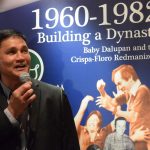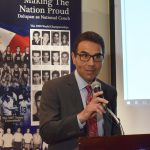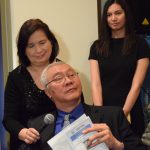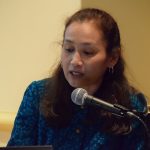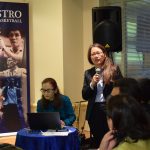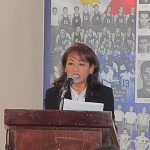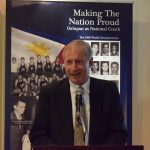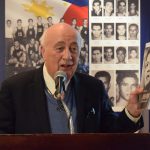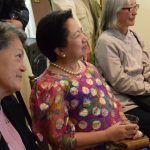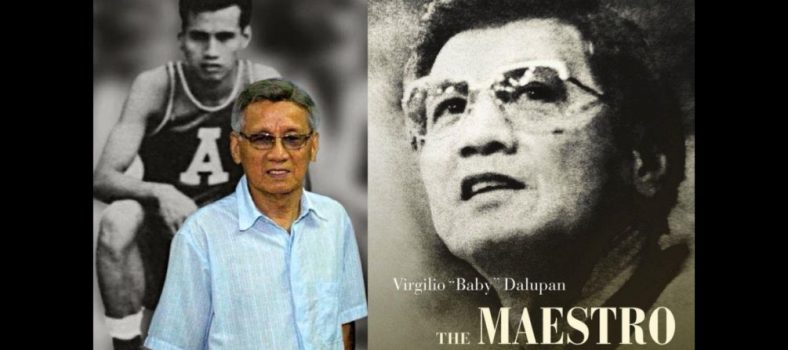Coach Dalupan Book “The Maestro” Makes Triumphant U.S. Debut
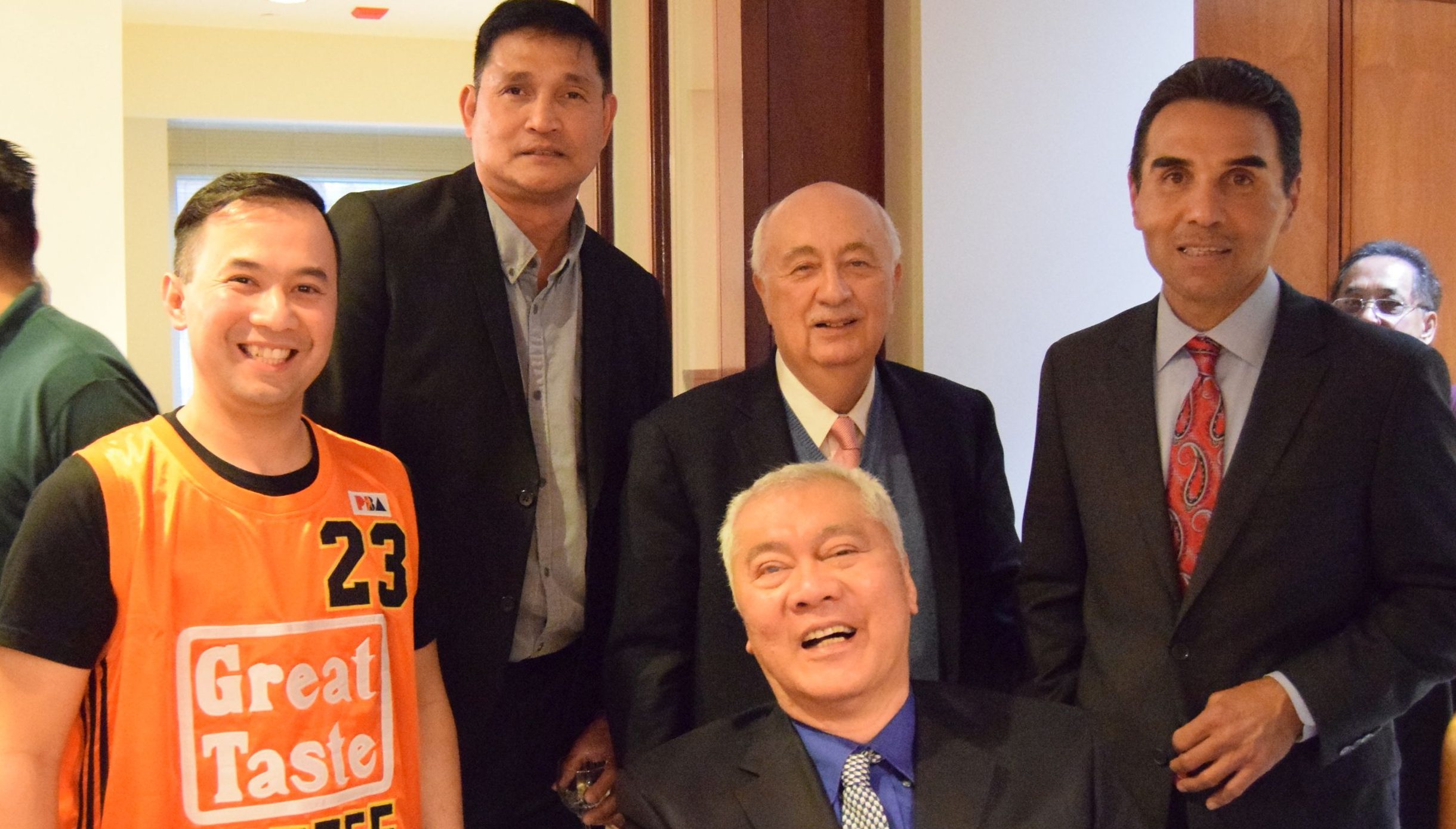
WASHINGTON, D.C.- On 28 April 2016, basketball fans flocked to Romulo Hall of the Philippine Embassy to witness the US launch of the book, “The Maestro of Philippine Basketball,” which chronicles the life and career of legendary coach Virgilio “Baby” Dalupan.

Coach Virgilio “Baby” Dalupan. Photo credit: Dalupan Family Collection
“Coach Dalupan was not only a coach but a mentor, and an inspiration to those who share his love and passion for the sport. This biographical work clearly shows how his sterling achievements continue to reflect, and at the same time, influence the evolution of Philippine basketball,” Philippine Ambassador to the United States Jose L. Cuisia, Jr. said in a video recorded message.
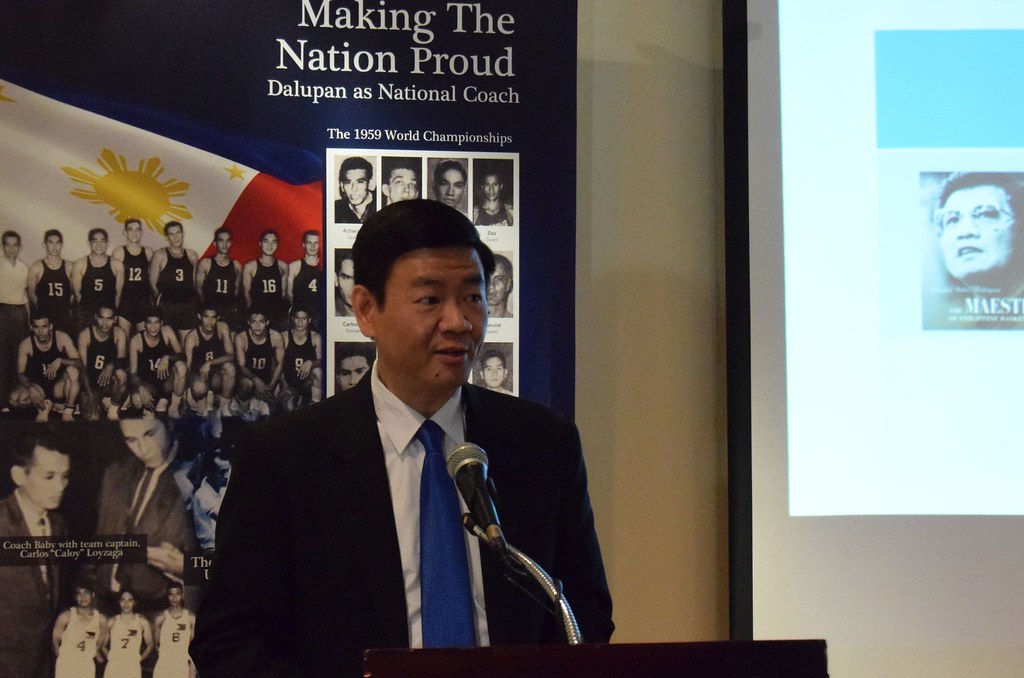
Deputy Chief of Mission Patrick Chuasoto delivers Ambassador’s remarks. Photo credit: Sasha Milentey
Embassy Deputy Chief of Mission, Minister Patrick Chuasoto delivered Ambassador Cuisia’s formal remarks. He noted the applicability of the Maestro’s leadership and mentoring principles to business, diplomacy and life in general.
“Opposing coaches knew very well Coach Dalupan was great in making substitutions and addressing match-up situations. But more than that, Coach Dalupan knew how to create a team and make it win. People would think that it is so easy to coach a team composed of talented players. This is far from reality. The coach has to handle the individual personalities of these players and have them collectively play as one. This is no mean task and Coach Dalupan was able to do that. This is a leadership lesson from Coach Dalupan we should emulate.”
“The Maestro,” which was launched in the Philippines on October 19, 2015 on Coach Dalupan’s 92nd birthday, is a collaborative work of his family and friends, featuring a roster of contributing writers that includes veteran sportswriters Noel Albano, Ignacio Dee, Rick Olivares, and Krip Yuson and the coach’s former players Ricardo “Ricky” Brown, Andres “Chito” Narvasa and Sandy Arespacochaga. Tim Cone, who surpassed the Maestro’s championship record in the Philippine Basketball Association (PBA) to take the title of “winningest coach” in February 2015, wrote the Foreword. “It was his ability to bring talent together, give them a clear vision of how to become successful, and then orchestrate championship after championship…with the court as his stage, that he became known as ‘The Maestro’.”

Project Manager Jun Jun Capistrano (top left), Contributing Writers, and Dalupan daughters (bottom row) collaborated to complete and publish the book in October 2015. Photo credit: Dalupan Family Collection
Dalupan daughters M. Cecilia, Maria Lorenza, Josefina, Mary Ann, Maria Consuelo, Loulie and Cristina provided editorial guidance, together with book project manager Jose Capistrano, Jr. and Tessa Jazminez.
“In recounting the many significant periods in the life of Coach Baby Dalupan, this book contributes to the history of Philippine basketball. It pays tribute to the man many call ‘The Maestro’ and it’s a way of giving back because net proceeds from the book will be directed to athletic scholarships for deserving students at the Ateneo De Manila University and University of the East, two schools that were instrumental in the life of Coach Baby Dalupan,” explained youngest daughter M. Cecilia.
Coach Dalupan compiled a win record of 52 championships through the college and professional ranks. He was also named head coach of the Philippine national team for the 1959 FIBA World Championship and 1970 Asian games.
In the PBA, he led celebrated teams Crispa Redmanizers, Great Taste Coffee and Purefoods to their history-making triumphs on the court. However, it was the Maestro’s fatherly love and concern that left the biggest mark on the players he coached.
“Hindi ko makakalimutan kung paano niya ako tinuruan, paano masasabi ko na mailabas ang aking galing sa paglalaro ng basketball (I will not forget the lessons he taught me and how he brought out the best in me.)” said five-time PBA All-Star and three-time PBA Mythical Team awardee, Manny Victorino.
“Parang ama po namin yan. Parang isa po kaming pamilya kapag naglalaro ng basketball (He was like a father to us. We were like a family when we play basketball.)” he added. Two-time PBA Most Valuable Player Abet Guidaben credited the Maestro for his achievements.
“He turned me from someone who played basketball into a true basketball player,” said Guidaben, who finished his PBA career as the No. 2 all-time leading scorer with 15,775 points and No. 2 all-time in total rebounds with 8,570.
- PBA All Star Player Manny Victorino
- Featured Speaker and PBA Hall of Famer Ricardo “Ricky” Brown
- Abet Guidaben and family
Ricky Brown, the first Filipino-American to play in the PBA, recalled the words of encouragement repeatedly imparted to him by Coach Dalupan as he initially faced opposition and jeers of “displeased” fans. “He told me, ‘Keep working hard, carry yourself as a professional, play that game the way you play and I promise you that, in time, things will change,'” Brown recounted. And they did, as Brown became a fan favorite. “He was right. Things changed. It took a while but it finally did,” Brown said.
- Ma. Cecilia G. Dalupan narrates the Story of the Book which began in 2003 from a scrapbook of photos and memorabilia
- Sisters Dalupan during the presentation
- Mary Anne Dalupan delivered the Maestro’s message
Mary Ann Dalupan delivered the Maestro’s message for the audience composed of fans, friends of the Dalupan family, US-Philippines Society members, Embassy personnel led by Madam Maria Victoria Cuisia and others.
“I have been away from the bench for over two decades. Yet, here you are, all of you, to celebrate the book about my coaching years. I’m both humbled and overjoyed by your loving memories and your good wishes,” read the first part of Coach Dalupan’s message.
“Thank you from the bottom of my heart – to all those who were with me along the journey, to enable me to do what I loved most, which was coaching. I remember with gratitude fellow coaches, basketball officials, team owners, managers and staff, all my friends and fans. But most of all, I want to say to Ricky Brown, Abet Guidaben Manny Victorino and all my players, thank you. I am honored to have been your coach,” said the coaching legend.
- US-PH Society Executive Director Hank Hendrickson, Master of Ceremonies
- US-PH Society President Ambassador John F. Maisto delivers the closing remarks
- (L-R) Mrs. Consuelo Maisto and Mrs. Vicky Cuisia
“This book depicts this relationship, the fact that Filipino-American players came to play is a big deal. Baby Dalupan is involved in it,” Ambassador Maisto said.
The US launch of “The Maestro” was co-organized by the Dalupan family with the Philippine Embassy and the US-Philippines Society.
To get a copy, please visit the dalupanbooks website.
To view the interview after the book launch in the Philippines, please click on the following link – CNN Interview: Dalupan Book Launch
Please visit the US-Philippines Society Flickr page to see more photos.

